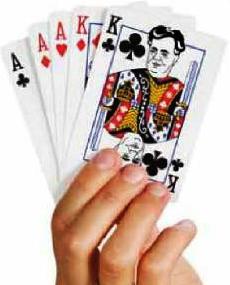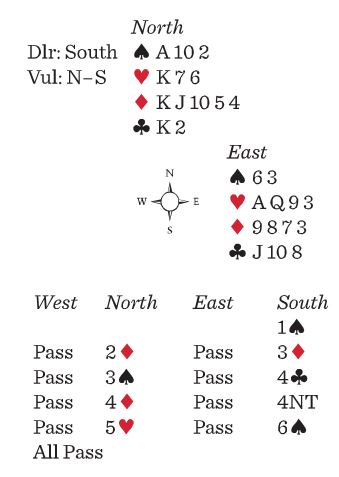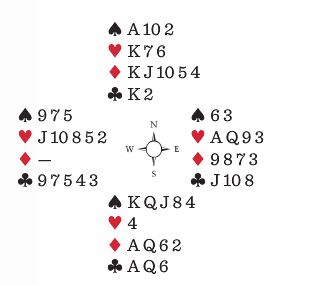May 2016 ACBL BRIDGE BULLETIN 




South opened 1 and eventually found himself in 6
and eventually found himself in 6 . The auction included a couple of interesting bids. North liked his hand when South bid 4
. The auction included a couple of interesting bids. North liked his hand when South bid 4 , but he didn’t want to go past 4
, but he didn’t want to go past 4 . At the same time, he didn’t want to bid 4
. At the same time, he didn’t want to bid 4 and have the bidding stop. He considered bidding 4
and have the bidding stop. He considered bidding 4 , but settled on 4
, but settled on 4 , hoping South would know that North would have bid 4
, hoping South would know that North would have bid 4 with a minimum hand.
with a minimum hand.
When South asked for aces, North bid 5 to show that he had two key cards. Because diamonds had been bid and raised, the
to show that he had two key cards. Because diamonds had been bid and raised, the  K was treated as a key card. South settled for 6
K was treated as a key card. South settled for 6 , and OEast led the
, and OEast led the  J.
J.
East was pleased with this lead. How should East defend? In fact, when dummy played a low heart, East signaled with the  9. South followed with the
9. South followed with the  4 and that was the end of the defense. South ruffed the next heart and claimed.
4 and that was the end of the defense. South ruffed the next heart and claimed.
This was the layout:
You can see that if East had won the first heart and returned a diamond, West would ruff and the slam would be down one. Would you have found this defense?
This is a good hand for the kibitzers, but less so for the defenders. Here are some things to help East decide:
1. East has to keep the bidding in mind. South did raise diamonds, so he has at lEast three of them. That means OEast has one or none. When you are on lead against a slam, a singleton is often effective. West didn’t lead a diamond, so East’s thoughts should include this fact.
2. South bid 4NT and then a slam with nothing in hearts. Assuming that East trusts South not to have two losing hearts, he should know that there is only one heart trick for the defense. East should definitely think of that before making his play at trick one.
Now comes an interesting thought. Most everyone plays that when the opponents bid a slam, the player not on lead can double to ask partner to make an unusual lead. What might it mean if West doubled 6 ?
?
In all my years of playing, I can’t recall someone doubling a slam when they were on lead for the reason that they wanted partner to do something. What do you think about a double by West?
It sounds like the opponents are missing an ace. If so, the bidding suggests it is the  A. Given that this conclusion is correct, West might opt to double and lead a heart. If East has the ace and if he thinks for more than a second, he should work out what West is doing. If East doesn’t have the
A. Given that this conclusion is correct, West might opt to double and lead a heart. If East has the ace and if he thinks for more than a second, he should work out what West is doing. If East doesn’t have the  A, there is still a chance that he has the ace of trumps. I would guess that East will have a fast entry more than half the time.
A, there is still a chance that he has the ace of trumps. I would guess that East will have a fast entry more than half the time.
This means, if double is taken for what it is, that 6 doubled down a trick will be a top. If West doesn’t double, 6
doubled down a trick will be a top. If West doesn’t double, 6 will make a lot more often than not. There is another question lurking. If West doubles, might the opponents find a better spot? This is usually a silly question, but it does come up. On this layout, North can make 6NT, but unfortunately for him, South bid notrump first when he bid 4NT. Bet he didn’t think that this would wrong-side a possible 6NT contract.
will make a lot more often than not. There is another question lurking. If West doubles, might the opponents find a better spot? This is usually a silly question, but it does come up. On this layout, North can make 6NT, but unfortunately for him, South bid notrump first when he bid 4NT. Bet he didn’t think that this would wrong-side a possible 6NT contract.
Esta entrada también está disponible en: Spanish



